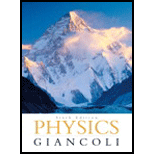
(a)
The mass of the second croquet ball.
(a)
Answer to Problem 28P
Explanation of Solution
Given:
Mass of first croquet ball is
Initially second croquet ball is at rest. That means initial speed of the second croquet ball is zero.
After collision, speed of the second croquet ball is half of the initial speed of the first croquet ball.
Formula used:
Let
That is,
Where,
Also, for a perfectly elastic one dimensional collision,
Calculation:
It is given that,
Substituting these in equation
Substituting
Substituting the numerical values in equation
Conclusion:
The mass of the second croquet ball is
(b)
The fraction of the original kinetic energy
(b)
Answer to Problem 28P
Explanation of Solution
Given:
Mass of first croquet ball is
Formula used:
Let
Total kinetic energy of the balls before collision is,
Since,
Kinetic energy of the second croquet ball after collision is,
Since
Calculation:
The fraction of the original kinetic energy gets transferred to the second croquet ball can be calculated as,
Conclusion:
The fraction of the original kinetic energy gets transferred to the second croquet ball is
Chapter 7 Solutions
Physics: Principles with Applications
Additional Science Textbook Solutions
College Physics
College Physics: A Strategic Approach (4th Edition)
University Physics Volume 2
College Physics
The Cosmic Perspective
Essential University Physics (3rd Edition)
 College PhysicsPhysicsISBN:9781305952300Author:Raymond A. Serway, Chris VuillePublisher:Cengage Learning
College PhysicsPhysicsISBN:9781305952300Author:Raymond A. Serway, Chris VuillePublisher:Cengage Learning University Physics (14th Edition)PhysicsISBN:9780133969290Author:Hugh D. Young, Roger A. FreedmanPublisher:PEARSON
University Physics (14th Edition)PhysicsISBN:9780133969290Author:Hugh D. Young, Roger A. FreedmanPublisher:PEARSON Introduction To Quantum MechanicsPhysicsISBN:9781107189638Author:Griffiths, David J., Schroeter, Darrell F.Publisher:Cambridge University Press
Introduction To Quantum MechanicsPhysicsISBN:9781107189638Author:Griffiths, David J., Schroeter, Darrell F.Publisher:Cambridge University Press Physics for Scientists and EngineersPhysicsISBN:9781337553278Author:Raymond A. Serway, John W. JewettPublisher:Cengage Learning
Physics for Scientists and EngineersPhysicsISBN:9781337553278Author:Raymond A. Serway, John W. JewettPublisher:Cengage Learning Lecture- Tutorials for Introductory AstronomyPhysicsISBN:9780321820464Author:Edward E. Prather, Tim P. Slater, Jeff P. Adams, Gina BrissendenPublisher:Addison-Wesley
Lecture- Tutorials for Introductory AstronomyPhysicsISBN:9780321820464Author:Edward E. Prather, Tim P. Slater, Jeff P. Adams, Gina BrissendenPublisher:Addison-Wesley College Physics: A Strategic Approach (4th Editio...PhysicsISBN:9780134609034Author:Randall D. Knight (Professor Emeritus), Brian Jones, Stuart FieldPublisher:PEARSON
College Physics: A Strategic Approach (4th Editio...PhysicsISBN:9780134609034Author:Randall D. Knight (Professor Emeritus), Brian Jones, Stuart FieldPublisher:PEARSON





